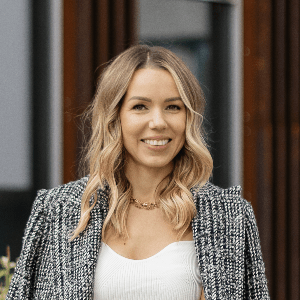I’m a computer engineer transformed into a ⚙️ passionate No Coder ⚙️. Reach out if you want to get introduced or learn more about the No Code world!
It’s not so complicated: Starting an online business
About this episode
Have you ever considered starting an online business?
Have you started one and stress is all over the place?
In this episode, Dovile is sharing her experiences around starting an online business!
What they talked about:
- Common misconceptions about online businesses
- What to prioritize when starting one
- “Doing your math”
- High vs Low ticket offers
- The mindset behind service-based businesses
And all this in less than 16 min!
Transcript
Dovile Sinke: Hi, everyone. So my name is Dovile. I’m an online business coach, I help mainly women to quit corporate career, to quit their 9 to 5 job and start an online business and show that it’s so much easier than you usually think. I quit my job myself, four years ago, after working nine years in corporate, and I never looked back, today, I have created three different businesses, mainly service based businesses. And today on top of that, I also coach other women, to help them do the same and experience more freedom in their lives, travel the world, raise families, and live like myself half a year in Bali, half a year in Europe, or whenever you would love to.
Spyros Tsoukalas: Welcome Dovile. I’m excited to have you here. And yeah, it’s pretty exciting to discuss about starting an online business. So what are your main thoughts? Like, when people consider starting an online business? What are the most common misconceptions around this topic?
Dovile Sinke: So most of the women that come to my world, they feel like, so we have those limiting beliefs, that it’s probably too late for us to start something, because maybe we invested a lot of money in our studies, then in our careers, and then it feels like shit, I just had all those money, all that energy, and all those years behind me doing something, why should I now change it, and they feel like it’s too late, they feel they will not be able to replace the corporate salary, salary. And even you know, just like make more money, they just feel it’s not for them, it feels exciting, but it’s not for them. And it’s just a limiting belief that, you know, we have to overcome. And another thing that I also noticed a lot of time is that people think that they don’t have enough skills to start a business online, like they feel you just have to be maybe, you know, super good graphic designer, or maybe a developer. But if you were working in corporate and you were doing project management, or you were a manager in some other role, they feel like no, I can’t do anything online. And that’s, again, not true. It’s just the limiting belief we have. Because, like, you have to think somebody else trusted you with their company and pay you this big salary, you know, to do the job to run the company, why wouldn’t you be able to run your own company? So yeah, these are probably the main kind of misconceptions that I feel with women and people in general that come to me and tell me, I would love to do that. But it’s not for me.
Spyros Tsoukalas: You reminded me of that quote that says something like when you want to like move forward, your your goals, you just have to start moving in general. And yeah, I guess that people get empowered enough to start moving towards the direction they want to. So let’s say that there are people that overcome these fears and these misconceptions, and they are have decided they’re actually very committed to starting an online business. So what should they be prioritising? Because there are tons of things they can be doing, like, from their idea to their execution, what are the steps that they should be getting through in order to launch a successful online business?
Dovile Sinke: So first thing I always tell is, do your math. And it might sound really simple. But believe me, I also myself didn’t do that in the beginning, how weird it sounds with my first online business, and actually not the first couple of first businesses. And what I mean with math is really be clear about your business model, like how are you gonna make money so put yourself a goal, say, you know, maybe you want to make that amount a month? And, or maybe, you know, you want to replace a corporate salary, whatever that is. And think really, like if that idea that you have, and the business model is gonna meet that goal. So for example, a lot I see a lot so I’m in a service, business world, right? I help people that sell services, maybe their transformation providers like coaches, or maybe they you know, they have an agency, and they help other people. So, I see a lot of people that they feel oh, I will just create a digital template or digital course that I can sell for $19 or even like 100. And I’ll become rich, because they they hear all these success stories of somebody launching a membership, somebody launching? Exactly that course, you know, I mentioned for $90, and they hear like, oh, you know, I launched it. And I immediately got 1000s of subscribers, and I made money while I was sleeping, like this happens just to very few of people. So you have to really, you know, then think, okay, if you will make nine $20 from one template, like how many templates and your goal is maybe to have, you know, $5,000 a month, right. So think how many templates you have to sell every month, you know how many people you actually have to convince every month to buy from you, especially if you’re just starting. And this will be a lot of people, that’s where I usually, you know, suggest people to start with more like high ticket services, something that they can charge for a higher price. And you know, have to serve a little bit less people and convince basically, because every buyer has to make a buying decision, no matter if it’s $20, or a couple of 1000, there’s always a buying decision. So yeah, do your math and really understand, you know, the consequences, or for example, somebody you know, they say, I will sell some goods, I will open my online store, or and I will sell this product, and they feel like oh, I will make $1 margin from that product. But then you know, to make those 5000, for example, which could be your goal to make a living, you have to sell 5000 goods, that means probably, you know, 5000 people have to know you and come to you each month to buy something. So like this simple math, sometimes usually I see that people overlook. And, yeah, like, the other one is like, usually, you know, if we’re just talking about the start, I usually tell people, you know, like, think I feel like there are three ways to serve people. So you could do something that others don’t have time to do. For example, you know, like, you could do social media posting for somebody, that’s something that usually people know how to do, but they don’t have time. Or the second way to serve is like really, if you know, you feel like you could do something better than others. So for example, you know, maybe people could do like graphic design now with Canva. But they are not as good, they don’t have maybe the eye so you could be the one, you know, having the eye having, like a little bit more knowledge so doing something better. Or the third way, like how to serve people could be you know, like, learn something that others find too complicated. So for example, the same SEO, that we also have an agency, so I’m familiar with that, like you could do those services, because a lot of people feel like, oh, that’s something out of my world, or Facebook ads, Instagram ads, website development coaching. So yeah, there are like, three main ways you know, how you can serve people and find business ideas, even if you feel like there are no ideas for you.
Spyros Tsoukalas: Thanks for this extensive and detailed reply. So you mentioned the term high ticket offers. Can you explain to us what this means?
Dovile Sinke: Yes, exactly. That’s the example that I mentioned with people not doing the math and going for something like low ticket. And that means, you know, maybe jumping on creating a membership, where it feels like, usually quite cool, you know, somebody will pay me 20 $30 and $50 every month, but again, you know, like this is a low ticket offer, or because we hear a lot on the podcast, we hear a lot about online that, you know, or I created a course and suddenly I make 1000s of dollars while I’m sleeping. And without having an audience you know, especially if you’re starting without you having maybe you know, without you being a big influencer is gonna be very difficult to make money. Focus on being a superior person, like offering a high ticket offer, which means a service that is really, you know, customised to somebody that could be you know, you’re very niched out and for example, you so just a simple example, if you are selling social media, managing, you know, like as a service, you could be a social media manager, and you could offer services on Fiverr on Upwork. And maybe, you know, get a couple of hundreds of dollars for that. Or you could really, you know, like niche out and you could say I’m a social media manager, I create killing content for are female coaches and you go to the you find those coaches, you focus on creating a contact, creating a relationship and you tell them, hey, look, I’m gonna run your social media so that you get loads of requests from your potential clients in your DM, you know that people are starting asking how they can work with you, just because I will understand what those people want. And I will post such content that is super engaging, and is really focused to their needs. That’s the high ticket service, that’s something they can charge, even a couple of 1000s for.
Spyros Tsoukalas: Makes total sense. But like you made me think of service based businesses, would you like to highlight what are the differences are the things we might be missing around them? I think this is well within your expertise. So I guess, you know, way more than we simply understand by the term.
Dovile Sinke: Yes. So because indeed, I focus mainly on service based businesses and coaching people in that, because that’s how I make my living, you know, and that’s all my businesses have been around that. And probably, you know, what I would like to tell everybody is just to really understand that you can start a business in the field, even in the field that you don’t particularly have expertise in. And what I mean by that is, for example, you could be maybe you’re really good and managing people, maybe have that, you know, from your corporate career, you’re good and delivering presentations. Having a strict timeline, really, you know, good and connecting with people and you know, the right people and you know how to find the right people, then you can even then, you know, you can, but for example, maybe you’re not such a good graphic designer yourself, right, you could still create a graphic design agency, you could be the one, you know, leading it have a simple understanding of, you know, visuals and what does it entail, but you could get people like freelancers in your team that could deliver those projects for you, but you would be the one, you know, going out, because you’re so good at it, you know, going out talking to people connecting to people, showing them you know, and like really making them trust in you. And you simply get the job done by somebody else. So that you can also do as well, you know, and you can run a great business as well. So this is, you know, something that I just want to highlight when we think about service based businesses, because a lot of times I just hear like, Oh, but I don’t have expertise. And that means I can never have this type of agency.
Spyros Tsoukalas: Okay, and I tend to forget sometimes the way of thinking you just describe like, I know, I knew this in the past, but had forgotten and then you just reminded it to me. So I think what the concept you just described is really interesting. So we are reaching towards the end, I have two bonus questions for you. The first one is what’s your favourite tool lately? And the second one is, what’s the most interesting thing that you have learned recently?
Dovile Sinke: So my most favourite tool, I probably have a couple but recently I’ve been yeah. I just on boarded a new person to my team. So Asana has been really helpful in that, oh, and Loom for sure. That’s, you know, showing how to do all the different pieces for the onboarding. And the most what are the thing that I learned recently? Maybe just one thing that I got reminded today, I had a discussion with my clients. So I ran like a group coaching programme, and we had a meeting today. And we spoke about dreams. And yes, it’s a business mastermind group coaching. But it’s super, I believe in mindset, that mindset is everything. And I include that in my programmes. And what we discussed and what why God reminded that, you know, for us to achieve dreams, we have to have those dreams. And very often we don’t, when somebody asks us, you know, how do you envision your ideal lifestyle? people be like, Oh, I don’t know. So, so yes, I got through mind that I had to have to look over my own dream list, you know, and work on it a little bit more.
Spyros Tsoukalas: Let’s hope that more people will do that as well. Dovile thank you very much for taking the time to share with us your expertise and your insights around starting an online business. And I hope you enjoyed your time with us as much as I did.
Dovile Sinke: That was amazing. Thanks a lot and thanks to GrowthMentor for everything. I met great people through here.
Spyros Tsoukalas: Thank you very much for contributing to our community. We’re very welcome.
Dovile Sinke: Thank you!
In this episode


I’m an online business coach that helps ambitious women to start and scale their own service-based online businesses, so that they can enjoy more freedom in life.
Join the community
Enjoy the peace of mind that advice is always only one Zoom call away.

